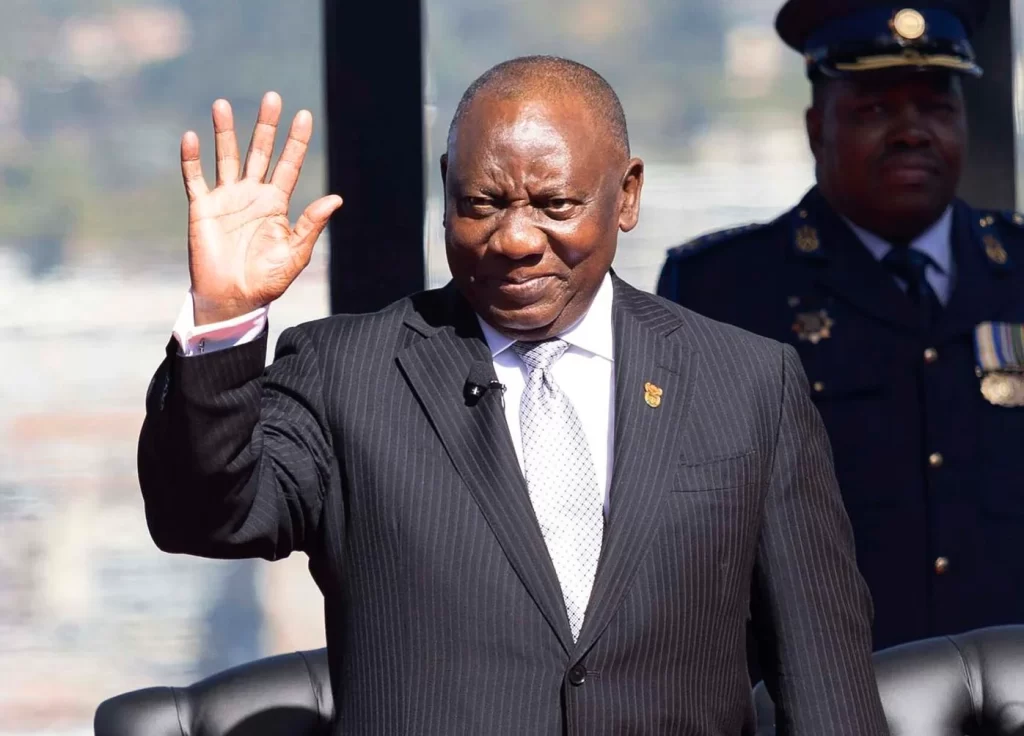Ramaphosa won’t be charged over farm scandal – SA prosecutor
3 min read
FILE - Cyril Ramaphosa waves as he arrives ahead of his inauguration as President, at the Union Buildings in Tshwane, South Africa, June 19, 2024.

FILE - Cyril Ramaphosa waves as he arrives ahead of his inauguration as President, at the Union Buildings in Tshwane, South Africa, June 19, 2024.
South African prosecutors have decided not to pursue criminal charges against President Cyril Ramaphosa in connection with a controversial farm theft scandal that nearly led to his political downfall two years ago. This decision follows a comprehensive investigation into allegations that Ramaphosa attempted to conceal the theft of $4 million (£3.25 million) in cash from his game farm located in Limpopo province.
The scandal erupted when former intelligence chief Arthur Fraser filed a criminal complaint against Ramaphosa, accusing him of irregularities related to the theft. Fraser alleged that the president not only failed to report the incident to police and tax authorities but also orchestrated the kidnapping and interrogation of the robbery suspects to silence them.
In response to these allegations, Ramaphosa has consistently denied any wrongdoing, asserting that the money stolen from his sofa in 2020 was derived from legitimate buffalo sales at his Phala Phala farm. He has maintained that he reported the break-in to law enforcement and disputed the total amount involved in the theft.
After a thorough investigation, the National Prosecuting Authority (NPA) announced that there was insufficient evidence to substantiate claims of corruption, money laundering, or tax evasion against the president. Ivy Thenga, the Director of Public Prosecutions in Limpopo, stated that the decision not to charge Ramaphosa was made after a careful assessment of the evidence presented by the Directorate for Priority Crime Investigation (DPCI).
“The available evidence presented to prosecutors cannot sustain any charge,” NPA spokesman Mthunzi Mhaga confirmed. The investigation also looked into potential violations of income tax and foreign exchange regulations but found no grounds for prosecution.
The “farmgate” scandal had serious implications for Ramaphosa’s administration, generating political turmoil just before a crucial leadership vote within his party. In 2022, the African National Congress (ANC), which Ramaphosa leads, used its parliamentary majority to block an impeachment motion against him over the scandal. Furthermore, an anti-corruption watchdog cleared the president of any misconduct amid widespread calls for his resignation.
Despite the resolution of these allegations, the case against three individuals accused of breaking into Ramaphosa’s farm is still active. These suspects appeared in a Limpopo court earlier this week facing multiple charges, including housebreaking and money laundering. Their trial is scheduled to continue next month.
The investigation and its fallout have drawn considerable public attention and debate in South Africa, particularly regarding issues of transparency and accountability within the government. The allegations against Ramaphosa, alongside the circumstances of the burglary, have raised questions about governance and the extent to which political leaders can be held accountable for their actions.
Ramaphosa’s political future was uncertain as the scandal unfolded, but he managed to secure re-election as president in June, albeit under the pressure of having to form a coalition government. This was a significant achievement considering the turbulent political climate and the ongoing investigations at the time.
As the NPA closes the case against Ramaphosa, it marks a pivotal moment for the president and his administration. While he has been cleared of the most serious charges, the lingering implications of the scandal may continue to affect his presidency and the public’s perception of his leadership.
In a broader context, the case highlights the complexities of political life in South Africa, where allegations of corruption and mismanagement frequently dominate headlines. Ramaphosa’s situation serves as a reminder of the scrutiny faced by public officials and the critical importance of maintaining public trust in democratic institutions.
As the nation moves forward, the focus will likely shift to the ongoing case against the individuals accused of the actual theft and the broader efforts to address issues of crime and governance in South Africa. The president’s ability to navigate this landscape will be closely watched as he seeks to stabilize his administration and reinforce public confidence in his leadership.